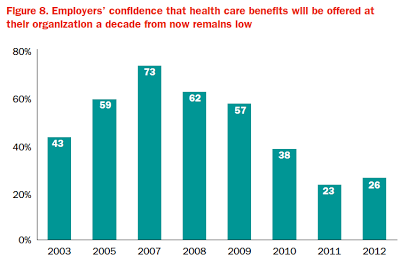As large employers respond to changes influenced by health care reform and rising costs of care, employees are paying a greater portion of their health-care costs. That trend that is likely to continue over the next few years, says a new
report on employer-based health plans.
Although employers cover most costs of work-based plans, employees contribute 42 percent more for health coverage than they did five years ago, while employers paid 32 percent more, according to the study from the benefits consultant Towers Watson and the National Business Group on Health. Overall, costs went up 34.4 percent.
When employers were asked if they thought health plans would change by 2018, which is the year the excise tax on high-cost plans takes effect, 92 percent said plans would be different, and nearly half said they expect a significant or transformative change. Such change will increase both accountability and engagement for employees.
 |
| % of large employers saying they were “very confident” they would offer health benefits in 2022 |
Nearly two-thirds of employers surveyed offer employees financial rewards to encourage participation in health programs, according to the report, which said tying employee contributions to successful completion of specific tasks, such as health assessments and screenings, remains the most popular contribution strategy. Growth in the use of penalties to engage employees in health-program participation has slowed over the last two years, but the use of surcharges for tobacco use continues to grow. By 2014, 62 percent of surveyed companies are expected to apply tobacco-use surcharges.
“While U.S. employers remain committed to health care benefits for active employees over the next five years,” the report says, “they are redifining their financial commitment in the short run and are more reluctant to commit to coverage for employees over a longer period.”
The 18th annual Towers Watson/National Business Group on Health Employer Survey on Purchasing Value in Health Care tracks employers’ strategies and practices. It was completed by 583 employers,between November 2012 and January 2013. The report says it identifies the actions of the best performing companies as well as current trends in health-care benefit programs of U.S. employers with at least 1,000 employees. Survey respondents collectively employ 11.3 million full-time employees and have 8.5 million employees enrolled in their health care programs. Download a report PDF by clicking here.

